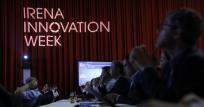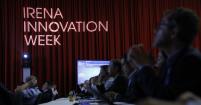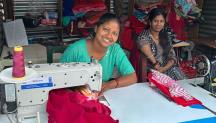

IRENA Innovation Week Discusses & Dissects Disruption in the Energy Sector
Newsletter
“The reality of the global energy transformation is surpassing all expectations. We are moving to a world where there is going to be cheap, abundant electricity. The challenge is to discover the innovations that will make this most useful in our society.” So opened IRENA Director-General Adnan Z. Amin IRENA Innovation Week 2018, the International Renewable Energy Agency’s biannual gathering of startups, corporate leaders, government officials and experts at the forefront of energy system innovation.
The energy transformation is indeed unfolding at a rapid pace. In 2017, global renewable energy reached a record 167 gigawatts (GW), the seventh year in a row where growth rates surpassed 8%. Driven by plummeting costs of renewables, a strong business case, and the political imperatives of climate change and sustainable development, around 10% of global power generation now comes from solar PV and wind, and this share will continue to grow.
At the same time, the fourth industrial revolution – where technological advances are blurring the lines between the physical and digital world – is creating new opportunities for renewable energy to power the energy system of the future. Digitalization, artificial intelligence and big data allow for new business models and power system management, turning them into potent enablers for integrating high shares of variable renewables into the energy mix.
This potent mix of technological convergence, economic competitiveness and political will set the stage for a fascinating series of discussions at IRENA Innovation Week, where participants discussed, debated and dissected the cutting-edge of energy, policy and business innovations that are driving the energy transformation forward.
"The reality of the global energy transformation is surpassing all expectations. We are moving to a world where there is going to be cheap, abundant electricity. The challenge is to discover the innovations that will make this most useful in our society." IRENA Director-General Adnan Z. Amin
In order to ensure that the energy transformation provides the maximum benefit to the greatest number of people a wide diversity of perspectives and approaches is needed. Participants from ninety countries were invited to the event, and from a range of private, public, and civil society entities. As Director of the IRENA Innovation & Technology Center Dolf Gielen stated, “innovation encompasses best practices, economics, and the overall context of the energy transformation.”
A broad range of innovations were also explored, as a way to capture the complex interplay of various technologies, markets, and areas of life that comprise the energy transformation. They were given focus through three separate tracks: Digitalisation & Decentralisation, Electrification, and Markets & Citizens.
Digitalisation & Decentralisation
In 2017, global investments in smart technologies rose by 6.5% to USD 49 billion. Connected devices worldwide are expected to increase from 23 billion today to 75 billion in 2025 – part of a technological shift that will considerably raise the potential for demand-side response and demand-side management. This, coupled with the electrification of buildings, industry and transport can further facilitate an increasing share of renewables in the total energy supply.
The Digitalisation & Decentralisation track took an in-depth look at how the increasing availability and use of digital monitoring and control technologies to dynamically manage generation, distribution and demand is providing new, more efficient and flexible ways to operate power systems. As 50Hertz CEO Boris Schucht noted, “We are now asking ourselves questions that we never had before, and this innovation across all sectors is essential to reach our ambitious renewables targets.”
Electrification
The Electrification track looked at ways to increase the share of electricity in the total final energy consumption of the transport, heat and industrial sectors, 80% of which come from fossil fuels and thermal renewables today. Electrification also holds promise with regards to the decarbonisation of road transport, with worldwide sales of electric vehicles growing at a meteoric rate. However, profound changes to charging, grid infrastructure and storage are needed to keep pace with these changes, requiring not only significant technological innovation, but also in terms of institutions and business models.
The industrial and heating and cooling sectors also attracted a great deal of discussion. Given that the building sector consumes proportionately more electricity than other end-use sectors, and the environmental and health risks associated with traditional biomass used for cooking, innovation in household, district and city heating and cooling must be a priority for the energy transformation. As the EU Heatpump Association’s Thomas Nowak explained, “The heatpump industry is not on the radar of people compared to EV charging, but it is no less important. Cities must consider the electricity needs and infrastructure needed to scale-up the electrification of domestic heating.”
Markets & Citizens
Finally, the Markets & Citizens track looked at the ways that increasingly distributed and localised generation and consumption of energy is allowing consumers and communities to become more active participants, and also at the business and institutional changes needed to ensure that the energy transformation advances sustainable development. A comment from Energyville’s Anjana Das served as a stark reminder to participants that discussions about innovation mean different things in different contexts, “Many individual homeowners in India cannot afford solar rooftops. Innovation is therefore not just about bringing the cost of technology down, but also about financing models.”
IRENA Innovation Week is not an isolated event. It is part of an ongoing, broad, international discussion among experts, innovators, policymakers, business and civil society leaders to set the direction of the global energy transformation. Such a discussion is vital to ensuring that the six-fold acceleration of renewables that is needed between today and 2050 if we want to meet global climate and sustainable development objectives is achieved. In this way, as IRENA Director-General Adnan Z. Amin put it, Innovation Week is a “boot camp for the army of innovators who are going to change the world.”




